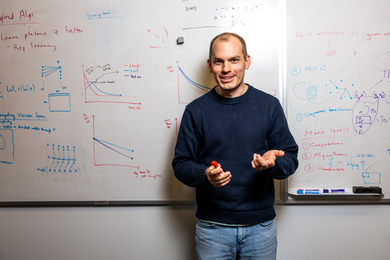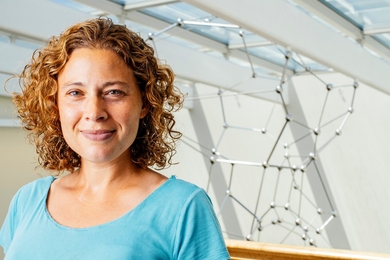Local nonprofits need financial help now more than ever, and the MIT community is responding with a big heart. The Community Giving at MIT campaign invites you to join the equation of generous MIT employees and retirees to help those in need in our local communities.
Gifts can be made by convenient payroll deduction, check, credit card or securities, and recipient options include the MIT Community Service Fund, the United Way of Massachusetts Bay and Merrimack Valley, or your favorite local charity. Donate online or request a donation form from the Community Services Office (617-253-7914 or community-giving@mit.edu). Community members whose donations are received by Dec. 31 will be entered in a raffle to win Red Sox tickets or other exciting prizes
Your participation matters
There are compelling and practical benefits to make your charitable donation through MIT. First, MIT does not deduct any administrative or credit card fees from your donation. The nonprofit that you support receives 100 percent of your donation. Second, giving via payroll deduction may be more financially feasible and convenient than writing a year-end check. Payroll deductions also benefit the recipient nonprofits. Payroll deductions made by a large group of employees quickly add up and your dollar goes further to amplify its benefit for nonprofits. MIT disperses these collective donations to recipient organizations and reduces the time and effort charities spend processing individual donations. Third, workplace and focused giving helps eliminate the clutter of charitable giving and provides donors with a “one-stop shopping” opportunity. As one donor expressed, “This program gives us a reason to give rather than an excuse not to.”
Your giving options
Questions?
Contact the Community Services Office (617-253-7914 or community-giving@mit.edu).
Gifts can be made by convenient payroll deduction, check, credit card or securities, and recipient options include the MIT Community Service Fund, the United Way of Massachusetts Bay and Merrimack Valley, or your favorite local charity. Donate online or request a donation form from the Community Services Office (617-253-7914 or community-giving@mit.edu). Community members whose donations are received by Dec. 31 will be entered in a raffle to win Red Sox tickets or other exciting prizes
Your participation matters
There are compelling and practical benefits to make your charitable donation through MIT. First, MIT does not deduct any administrative or credit card fees from your donation. The nonprofit that you support receives 100 percent of your donation. Second, giving via payroll deduction may be more financially feasible and convenient than writing a year-end check. Payroll deductions also benefit the recipient nonprofits. Payroll deductions made by a large group of employees quickly add up and your dollar goes further to amplify its benefit for nonprofits. MIT disperses these collective donations to recipient organizations and reduces the time and effort charities spend processing individual donations. Third, workplace and focused giving helps eliminate the clutter of charitable giving and provides donors with a “one-stop shopping” opportunity. As one donor expressed, “This program gives us a reason to give rather than an excuse not to.”
Your giving options
- The MIT Community Service Fund (CSF): provides financial support to student and staff service projects and to strong neighborhood-based agencies that have years of exemplary service to Cambridge and Boston families. A pledge to CSF is like backing the home team — your MIT colleagues and the students who take such pride in public service. The CSF awarded $136,000 in grants to 25 local non-profits and volunteer projects in 2009-10. One such project involved students from MIT’s Department of Architecture who worked with Cambridge high-school students to design and construct an innovative classroom space that is fun, safe and enlivens the urban landscape. The MIT Community Service Fund engages in valuable community building, both on campus and across Cambridge and Boston.
A few examples of service programs supported by the Community Service Fund and organized by the MIT Public Service Center include CityDays, the Freshman Urban Program and ReachOut: Teach a Child to Read. CityDays facilitates one-day service projects for 700 or more incoming freshmen and upperclassmen group leaders at 40 nonprofits in Boston and Cambridge as part of an MIT orientation. The Freshman Urban Program is an MIT pre-orientation activity that introduces 50 freshmen to the urban issues of their new home through an intensive week of community service and related discussions. ReachOut: Teach a Child to Read is a literacy tutoring program that matches MIT students with children at the Cambridge Community Center. - The United Way of Massachusetts Bay and Merrimack Valley: collaborates with government and human service agencies and local nonprofits to focus on three impact areas: children, youth and families. Donors can also designate the community impact fund that includes 120 partner community agencies or the United Way’s Math, Science, and Technology Initiative (MSTi) in which MIT participates.
- Your favorite local charity: Recognizing that MIT employees and retirees may have specific causes or nonprofit organizations they care about, donors may select their favorite local 501(c)(3) health or human services agency to support.
Questions?
Contact the Community Services Office (617-253-7914 or community-giving@mit.edu).







